Monday Feb 16, 2026
Monday Feb 16, 2026
Friday, 18 October 2019 00:00 - - {{hitsCtrl.values.hits}}
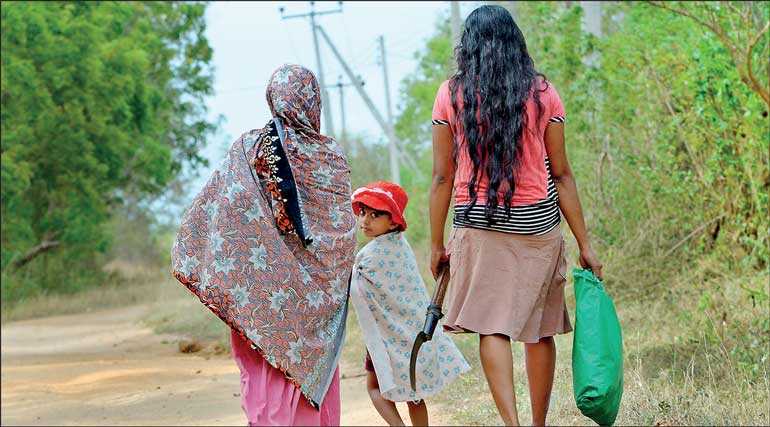
Security is a recurring theme in the Presidential Election. With the ghastly Easter Sunday attack still on our minds, it is natural to think of security only in terms of security against aggression. Unfortunately, 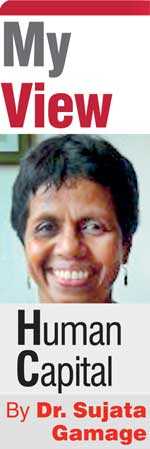 this kind of thinking can make us less secure by creating dissonance in our society. Viewing terrorism as the biggest threat has created a situation where minorities are viewed as the enemy, overshadowing socio-economic or climate threats.
this kind of thinking can make us less secure by creating dissonance in our society. Viewing terrorism as the biggest threat has created a situation where minorities are viewed as the enemy, overshadowing socio-economic or climate threats.
The deeper issues that affect our security as a country include:
(1) Getting old before getting rich
(2) Lack of preparedness of our youth to face global challenges, and
(3) Having no plans for climate change.
In the current election season, we need to ask our potential leaders how they plan to thwart these threats.
For example, I would tell them that we need to increase the labour force participation of women to address demographic threats before us, give a progressive world view to our youth to help us all face economic threats, and rapidly reform the transport and agriculture sectors, respectively, to mitigate and manage climate change threats. Let me elaborate why I feel these are the appropriate solutions to seek from our leaders.
Women to the fore to rescue us from demographic threats
The critical demographic danger that threatens our security is the ‘growing old before getting rich’ phenomenon. For example, as population statisticians point out, the population of age 60 and above in our country will rise to 29% in 2050, as against 12.5% in 2012. This phenomenon is already visible in our society.
We all know of daughters over 60 who care for their older parents with difficulty. Most of those daughters do not possess the economic or physical strength to look after another aged person. In developed countries, there are social services to support the elderly and the aged mother and daughter both would have some economic strength. Even though the welfare schemes available in our country have blessed us with longer lives, we still lack the financial strength to enjoy that longevity.
Meanwhile, only 37% of our women in the age range of 15-59 participate in the labour market. Of those who work, many are engaged in informal occupations that do not guarantee provident fund or pension benefits. In addition, women live nearly seven years more than men on average. Therefore, it is women in our society who will be both the cause and the effect of the ‘growing old before saving for old age’ phenomenon.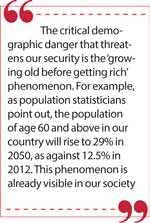
The reasons for the low participation of women in the labour market are complex. Some women may have become mothers before completing an education. Underage motherhood is not limited to the Muslim community as popularly believed.
For example, recently social workers found 88 mothers who are below 15 years of age in Angulana, Moratuwa, a Sinhala majority area. The Census of 2012 shows that 87,000 girls in the 15-19 age group reported that they are married, living together, divorced or widowed, with 72% of them being Sinhalese and 12% being Muslims, roughly mirroring the occurrence of ethnicities in the population.
The reasons for underage marriages, or childbirths to underage girls, are really due to the lack of education and/or poverty. In fact, as the level of education and economic status of women improves women have fewer children, irrespective of race or religion.
As the Al- Jazeera network reported recently, the drastic decline in the birth rate in Arabic countries is a result of a silent revolution initiated by women despite limitations imposed on them by their religion. For example, in the United Arab Emirates, Kuwait and Iran, 2019 birth rates are reported as 1.42, 1.88 and 2.15 respectively. This is remarkable considering that forty years ago the birth rates in those countries were close to seven children per woman.
Even among those who marry after they complete some education and plan their families to have no more than one to three children, many choose to stay away from the labour market due to lack of childcare, education, or skills, or lack of public transport facilities or safety issues in transport. Re-entry into the labour market too maybe deterred due to the same reasons.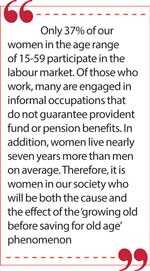
Small families are a reality and that makes every person, male or female, an equally important contributor to the economy and society. If we are to face the aging before getting rich phenomenon, we need to amend laws, regulations, and practices that impede the participation of women in the workforce. Childcare, better transport, flexible work hours are some of the issues identified.
For example, schools should not be places that burden working parents with more work but should be places that provide relief to working parents, by doubling as places that provide before and after school care for children.
Youth who can face globalisation with confidence
A second factor that affects our security is the inability of our society to face globalisation effectively. Negative effects of globalisation are many, but, engaging with global markets has enabled countries across the globe to raise the standard of living of their people. China and Vietnam, as well as small countries such as Singapore, are cases in point.
In contrast, our country is presently on the brink of an economic precipice largely owing to the lack of a strategy to participate in global markets. The result is not only a debt burden of Rs. 2 trillion, but an unnecessary tax burden on the population, and unemployment among the educated youth and other problems of low economic growth. The weakest in society are the worst affected. Therefore, it is essential that we arm our next generation with the skills and attitudes to face the challenges of globalisation successfully.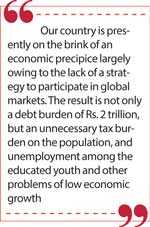
Competency in digital technologies needs special mention here. Thanks to the competitive global marketplace, any poor country now can obtain sophisticated technologies at affordable prices.
For example, thanks to advances in mobile communication technologies we are now able not only to keep in touch with family and friends but to advance our businesses or professions as well. The same technology is responsible also for propagating fake news, obscene videos and hate speeches, misleading not only children but adults. While educated families guide themselves and their children through the technological landscape to become closer to each other and to global knowledge sources, the majority of families do not have that capacity.
If we are to empower our youth, it is important to close this digital divide. We need to be more aware of digital technologies in order to advance ourselves and guide our children to navigate cyberspace safely. We also need to give our children the knowledge and skills that go beyond the requirements for passing examinations.
Our children should be equipped with transversal competencies, or competencies that cut across subject knowledge, such as critical and innovative thinking, personality development, interpersonal relationships, citizenship and digital literacy. Digital literacy is essentially the ability to seek information in the digital world, sift the good from the bad, and use the information effectively. Giving these competencies require a new approach to education.
Effects of education reforms take time to manifest, but visionary leadership can change attitudes overnight. Are we going to keep looking backward steeped in myth and mythology, or be open to the outside? Will our youth have the confidence that the competency of individuals does matter and elite-non-elite or young-old barriers can be overcome? What we need is visionary leadership that can give the right signals to our youth.
Visionary is not an adjective I would use for any of the presidential candidates, but visionary leaders are often not visionary individuals themselves. They are shaped by social forces around them. It is up to all of us to push our candidates in that direction.
Reforms in transport and agriculture to respond to climate threats
Environmental degradation impacts biodiversity, the climate and the health of humanity and their ability to secure food and water. These impacts should be addressed in one of two ways. First, we need to adapt and respond to the immediate threats facing us. Secondly, we should minimise and mitigate impending harms. 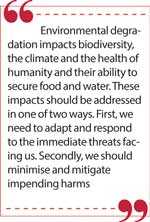
Climate change is no longer about mitigation only. Climate change is now upon us as an immediate threat that needs responses. Sri Lanka has been identified as one of the top three countries which suffered most floods and landslides caused by unusual rainfall and droughts experienced in recent times (Germanwatch, 2018). What do our political parties have to say about these extreme weather conditions which are likely to continue?
CNN recently ran a climate change quiz to rank various solutions. The unit of the effectiveness used was the equivalent number of cars taken off the road. For example, if nobody threw away food it would be equivalent to taking 593 million cars off the road they estimate.
Regardless of the methodology behind the numbers or the variability of effectiveness in different contexts, the most critical fact is that taking fuel-burning vehicles off the roads is a solution common to all situations. Given that transport affects most other socio-economic issues, we should be alert to what political parties have to say about transport.
As for what we should do to manage the consequences that are upon us already, I don’t have evidence, but the havoc caused by unusual rain patterns on my rooftop garden tells me that new ways of doing agriculture should be a priority.